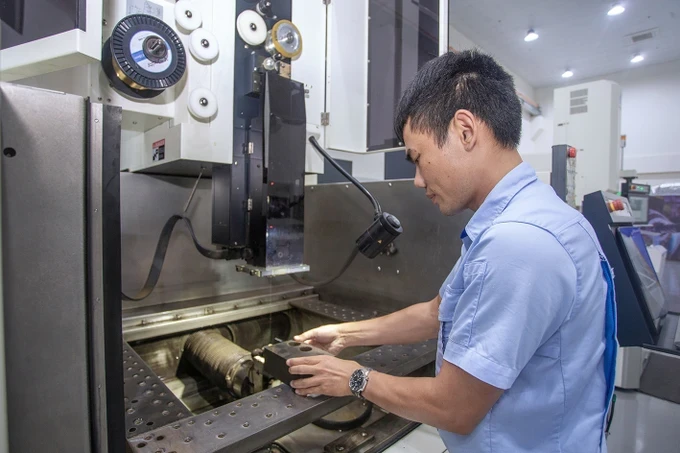Domestic businesses actively renovate to satisfy foreign supply chains
Domestic supporting enterprises have to heavily invest in upgrades of their production chains to successfully participate in global supply chains.

Chairman Do Phuoc Tong of the Board of Members of Duy Khanh Mechanical Co. shared that his organization has just opened Duy Khanh Precision Mechanical Factory in Saigon Hi-tech Park, with a total investment of over VND180 billion (US$7.42 million). This is the first plant in Vietnam to implement sintering technology to produce machine parts for the development of the hi-tech supporting industry.
The newly used technology greatly benefits the company thanks to its ability to consume 95 percent of the input material and to have mass production. However, it took the company more than 30 years to accumulate sufficient finance for this upgrade, during which it actively joined in various global supply chains like Toshiba Industry, Rinnai, MK Seiko, Bonfiglioli, Thermtrol, Sanei Technology, USM Health Care, Vinamilk, Nutifood, and Tan Hiep Phat. The enterprise also exported products to different countries of Canada, the US, Denmark, Germany, and France.
Discussing this matter, General Director Nguyen Ngoc Thinh of Tien Thinh Co. Ltd. commented that it is not wise for a business to wait until a client approaches to upgrade its plant. Instead, to increase its competitiveness, the business should invest in modern technologies, especially highly automatic manufacturing chains, before receiving new orders.
In reality, before a FDI enterprise create end-products in any regions in Vietnam, other companies in the same supply chain have either already invest in construction necessary facilities or devised a plan to supply parts to that FDI enterprise in the same region. Normally, member companies in this supply chain have operated for a long time and can usually update their technologies, leading to heavy competitive pressure for Vietnamese counterparts. Only when a domestic business is well-prepared can it earn an opportunity to join this chain.
Many other companies stressed the challenge to maintain in global supply chains. Besides offering reasonable prices, they have to continuously change product appearance and improve the quality.
Minh Man Co. Ltd. shared that instead of simply providing decal labels for Sanyo Group’s home appliances, to keep the partnership, the company now makes more complicated products such as machine parts and metal plating details
Deputy Director Nguyen Thi Kim Ngoc of the HCMC Industry and Trade Department informed that the industry sector has always occupied a high proportion in the city’s economic growth structure. Since 2016, the growth rate of the industry has been 7.83 percent on average. The activeness in improving the manufacturing capability of enterprises has greatly contributed to the rapid rise in the localization rate of supporting industry products in global supply chains, especially when the foreign investment flow is strongly poured into the country.
HCMC has identified the mechanical automation industry as a priority, and thus has introduced various supportive programs in the 2025-2030 period. Accordingly, besides capital support with preferential interest rates through the demand stimulus program, businesses are aided to connect to FDI companies via trade promotion activities.
The Deputy Director proposed that concerned enterprises should actively upgrade their production technologies and improve the capability of their staff to increase the localization rate of supporting industry products in global supply chains.
Businesses themselves suggested that functional agencies should devise suitable measures for FDI companies to help domestic ones in key industries buy new technologies or obtain core technology transfer in order to fulfill the above task.
Moreover, HCMC should urgently establish specific industrial parks or clusters operating under the market mechanism. These facilities, regardless of their location, should pay attention to similarities in the joined supply chain, and have sufficient planning for public services to serve laborers (healthcare, education, living environment).
There should be clear and detailed criteria to approve financial support for infrastructure, taxes, worker accommodation. The incentives from stimulus schemes should go along with suitable short-term and long-term capital support. It is necessary to allocate money for training and research activities as well as digital transformation process.
In related news, the Industry and Trade Ministry informed that today, it cooperates with related units to host the 21st Vietnam International Trade Fair, attracting the participation of 1,200 units from 22 nations and territories. The focuses of the fair this time are hardware, tools, garden and landscape decoration technologies, elevator and parts, sports, and bikes.
Domestic businesses in the fair display their supporting industry products and those to serve this industry so as to promote the supply capability of Vietnamese companies and to increase the autonomy of the domestic mechanical industry, especially the one in HCMC.
The fair also provides platforms for businesses to connect to their potential partners, buyers, and investors via product displays and seminars.
The fair lasts until December 9 in District 7 of HCMC.
|
Vice Chairman of the HCMC Association of Mechanical – Electrical Enterprises (HAMEE) Doan Vo Khang Duy commented that in the field of mechanics and automation, purchasing new machines to increase the output and performance is of extreme importance. Sadly, credit organizations have offered no strategic policies for these activities or provided them with remarkably high interest rate. HCMC and related ministries should help businesses in their research. It is also necessary to create an investment fund or link current ones to state fund management agencies, or even release suitable mechanisms for private funds to conduct investment schemes into mechanical-automation enterprises. These mechanisms should have open policies done via evaluations of each stage according to the development targets of each industry or product group. Only then can businesses have more favorable conditions to grow. |










